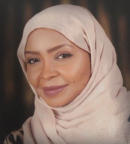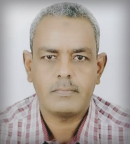Sudan is one of Africa’s largest countries, rich in underutilized natural resources but rife with conflicts and civil wars that have been ongoing since it gained its independence in 1956. These problems have reflected negatively on the health-care system. Khartoum, the capital of Sudan, is a busy city, hosting most of the country’s vital facilities, the center of government, corporations, universities, and health services. The city has more than 10 million residents, all competing for very limited health-care resources. This serious situation has worsened during the global outbreak of COVID-19 and reached critical levels during the second wave of the pandemic.

Nafisa Abdelhafiez, MD

Salah Osman, MD
Responding to the Onset of the COVID-19 Pandemic
Sudan closed its land and air borders at the beginning of the COVID-19 pandemic and launched a health education campaign. Hospitals applied all standard precautionary measures and social distancing. These measures were applied in all health facilities, including cancer centers, private clinics, and laboratories. The Federal Ministry of Health created new hotline services to receive calls from prospective patients.
As the closure of airports was sudden and prolonged, many Sudanese citizens were stranded outside of the country. The government faced substantial pressure from families asking for their relatives to be brought back home. Unfortunately, when these citizens were permitted to return to the country, they were not quarantined; rather, they were allowed to go home after registering their phone numbers and addresses, advised to self-quarantine, and told to report any symptoms through dedicated helplines.
Within 14 days of the first permitted flight, COVID-19 cases began to appear in Sudan, with the first case reported on March 13, 2020 (the patient had recently traveled from a neighboring country). Since then, cases have increased gradually. By July 2020, there were approximately 10,000 confirmed cases and 600 deaths—a death rate of about 6%.
Entering the Second Wave
Currently, Sudan is facing a second wave of COVID-19. The number of critically ill patients requiring hospital and intensive care unit (ICU) admission have overcome the capacity of the available hospitals, and there is a huge shortage in life-saving medications. Many patients who required respiratory support were not able to receive the optimal care needed at the hospitals. Patients with the financial resources have opted to buy oxygen cylinders, oxygen pulse meters, nasal cannulas, and masks to be used at home once required. Unfortunately, many patients couldn’t access these materials, and some died either at home or while searching for an ICU bed.
In December 2020, Sudan reached a critical situation; 40% of Khartoum residents were expected to become infected. The U.S. Centers for Disease Control and Prevention classified the COVID-19 spread in Sudan as level 4, the highest risk-assessment category.
As of February 2021, Sudan had nearly 28,000 COVID-19–positive cases. Approximately 22,000 people had recovered and 1,849 people had died. The death rate was about 6.6%. Many of these deaths were health-care workers, including physicians and nurses. One of the early recommendations from the Federal Ministry of Health was that physicians older than age 55 should not work during the pandemic, which worsened the existing staff shortage.
Providing Cancer Care During the Pandemic
Oncology centers are not necessarily facing a better circumstance than the rest of the hospitals, as the number of cancer cases does not match the capabilities of available services. Approximately 12,000 cancer cases are diagnosed annually in Sudan.
Khartoum is home to the largest oncology hospital in the country, Radiation and Isotopes Centre Khartoum (RICK), which provides free essential cancer drugs as well as low-cost investigations. RICK is a busy cancer center, with approximately 1,000 patients receiving oncology services each day. In addition, four private oncology centers and other small private clinics provide treatment, but with high out-of-pocket expenses that most patients cannot afford. As a result, many patients travel outside the country in search of cancer care.
In response to COVID-19, the radiation department at RICK minimized the number of patients and staff. The oncology center primarily provided palliative services, which addressed pain, spinal cord compression, and brain metastases. Many patients on adjuvant treatment were not able to attend their sessions because of the lockdown during the first wave and the high expense of transportation.
During the first wave of the pandemic, many hospitals were closed due to a lack of supplies. Resources such as personal protective equipment, oxygen, and other medical supplies were transitioned to emergency rooms and isolation hospitals as part of the COVID-19 response. Similar to other health facilities, RICK suffered from a lack of staff, medications, beds, and oxygen. As a result, many procedures, including curative surgeries for patients with cancer, were delayed.
Physicians at RICK worked with infection control experts to implement safety precaution measures and triage plans for patients with cancer. Systemic therapy for patients with metastatic disease was delayed, leading to disease progression in many patients. Patients on adjuvant chemotherapy could have their treatments administered at private oncology clinics, but patients who could not afford the cost of private medical centers had their adjuvant therapies interrupted.
Patients on hormonal and oral targeted therapies were provided with their oral treatments for a few months, but, unfortunately, the prolonged curfew interrupted appointment schedules and treatments. Many oncology centers don’t have enough medication to cover all patients, which is why patients weren’t able to refill their prescriptions for long periods. And many patients with cancer died because of medical complications other than cancer.
All oncology sections are affected by health professional staffing shortages. In December 2020, registrars and senior registrars went on strike because the Federal Ministry of Health stopped supplying personal protective equipment and safety supplies. Leadership at RICK is asking the government to prioritize the COVID-19 vaccination of patients with cancer since they are at higher risk of severe disease. Although there is a push to vaccinate the population as soon as possible, many citizens are skeptical of the vaccine due to misinformation on social media.
Public Reactions, Addressing the New Wave of COVID-19
Because of the falre-up of COVID-19 during the second wave across the entire country, health awareness campaigns, strict rules, and regulations led to substantial changes in the attitudes and practices of Sudanese citizens. They became more compliant and adherent to safety rules, good hand hygiene practices, social distancing, and masking. Social activities and gatherings are prohibited, but schools reopened in the beginning of February 2021. COVID-19 testing is requested before traveling and for everyone entering the country.
The government and private sectors minimized the number of staff and implemented strict health precautions. Currently, there are more hospitals for quarantine; however, the main hospitals are still short on oxygen, beds, and medication.
The prime minister declared on December 14, 2020, that Sudan is in the process of receiving 8 million doses of the COVID-19 vaccine. Health workers will receive the vaccine first, and then the government will try to make it available to all individuals. But as of now, no vaccine has been introduced.
DISCLOSURE: Dr. Abdelhafiez and Dr. Osman reported no conflicts of interest.
Dr. Abdelhafiez is a consultant in medical oncology at King Abdulaziz Medical City in Riyadh, Saudi Arabia. Dr. Osman is a consultant in clinical oncology at the Radiation & Isotopes Centre.

